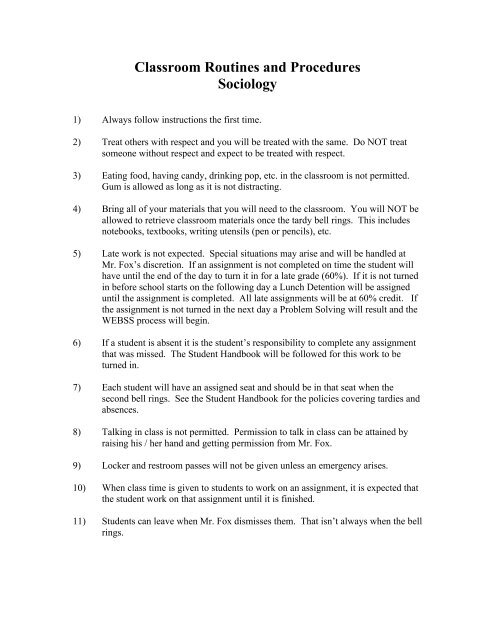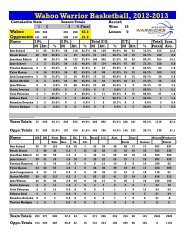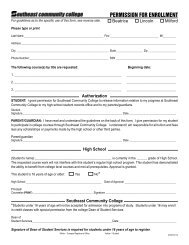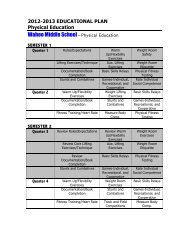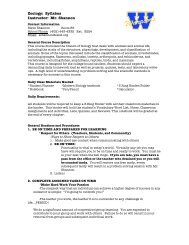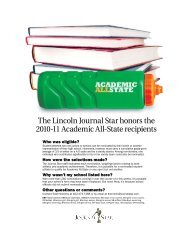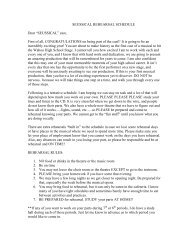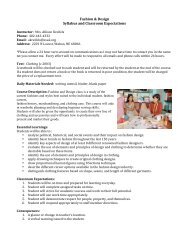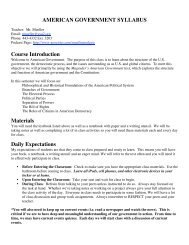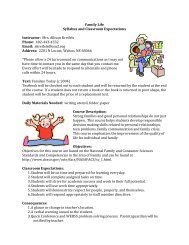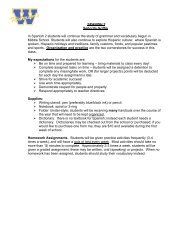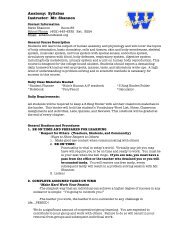Classroom Routines and Procedures Sociology - Wahoo Public ...
Classroom Routines and Procedures Sociology - Wahoo Public ...
Classroom Routines and Procedures Sociology - Wahoo Public ...
Create successful ePaper yourself
Turn your PDF publications into a flip-book with our unique Google optimized e-Paper software.
<strong>Classroom</strong> <strong>Routines</strong> <strong>and</strong> <strong>Procedures</strong><strong>Sociology</strong>1) Always follow instructions the first time.2) Treat others with respect <strong>and</strong> you will be treated with the same. Do NOT treatsomeone without respect <strong>and</strong> expect to be treated with respect.3) Eating food, having c<strong>and</strong>y, drinking pop, etc. in the classroom is not permitted.Gum is allowed as long as it is not distracting.4) Bring all of your materials that you will need to the classroom. You will NOT beallowed to retrieve classroom materials once the tardy bell rings. This includesnotebooks, textbooks, writing utensils (pen or pencils), etc.5) Late work is not expected. Special situations may arise <strong>and</strong> will be h<strong>and</strong>led atMr. Fox’s discretion. If an assignment is not completed on time the student willhave until the end of the day to turn it in for a late grade (60%). If it is not turnedin before school starts on the following day a Lunch Detention will be assigneduntil the assignment is completed. All late assignments will be at 60% credit. Ifthe assignment is not turned in the next day a Problem Solving will result <strong>and</strong> theWEBSS process will begin.6) If a student is absent it is the student’s responsibility to complete any assignmentthat was missed. The Student H<strong>and</strong>book will be followed for this work to beturned in.7) Each student will have an assigned seat <strong>and</strong> should be in that seat when thesecond bell rings. See the Student H<strong>and</strong>book for the policies covering tardies <strong>and</strong>absences.8) Talking in class is not permitted. Permission to talk in class can be attained byraising his / her h<strong>and</strong> <strong>and</strong> getting permission from Mr. Fox.9) Locker <strong>and</strong> restroom passes will not be given unless an emergency arises.10) When class time is given to students to work on an assignment, it is expected thatthe student work on that assignment until it is finished.11) Students can leave when Mr. Fox dismisses them. That isn’t always when the bellrings.
<strong>Sociology</strong>Semester Course<strong>Sociology</strong>:This course introduces the student to the discipline of <strong>Sociology</strong> <strong>and</strong> providesan underst<strong>and</strong>ing of the basic concepts. It also provides a basis for interestedstudents to build on for further study in college. Non-college students with aparticular interest in <strong>Sociology</strong> <strong>and</strong>/or an aptitude for the social sciences alsobenefit from this course.Topics for this course include: groups, culture, social interaction, HumanRights, prejudice & discrimination, <strong>and</strong> many others. Particular emphasis isplaced on developing an objective perspective on human behavior.Text Book - <strong>Sociology</strong>: The Study of Human RelationshipsUnit 1 Culture <strong>and</strong> Social StructureChapter 1 The Sociological Point of ViewChapter 2 Culture DiversityChapter 3 Cultural Conformity <strong>and</strong> AdaptationChapter 4 Social StructureUnit 2 The Individual in SocietyChapter 5 Socializing the IndividualChapter 6 The Adolescent in SocietyChapter 8 Deviance <strong>and</strong> Social ControlChapter 9 Social StratificationUnit 3Social InstitutionsChapter 12 The FamilyRequirements for successful completion of this course:• All students will need a Three Ring Binder to keep all class materialsin. Notes, Daily Work, Assignments, will be kept in this Binder.• Students will participate in classroom discussions/activities that dealwith moral dilemmas in our society today.• Student will take notes <strong>and</strong> will take quizzes over material in theirnotes.• All students complete a ten-minute presentation on a topic from theTextbook. The presentation will include a Power Point presentation.Presentations will be worth 200 points <strong>and</strong> used as a “Final Project”
grade for each student. These will be due the week of April 20 th –24 th .• All students will individually complete 9 abstracts. An abstract willconsist of a 1-2 page (Times/12 pt. Font) journal review on anapproved topic. Each abstract will contain a reference of the article(top of the page), a definition, a synopsis, <strong>and</strong> a synthesis. Eachabstract will be completed in APA format <strong>and</strong> will be worth 20 Points.The Deadline for the abstracts will be as follows:.First Abstract January 16, 2009Second Abstract January 30, 2009Third Abstract February 13, 2009Fourth Abstract February 27, 2009Fifth Abstract March 12, 2009Sixth Abstract March 27, 2009Seventh Abstract April 10, 2009Eighth Abstract April 24, 2009Ninth Abstract May 8, 2009• Along with the “Final Project” presentation <strong>and</strong> the nine abstractsseveral in-class activities <strong>and</strong> discussions will be conducted during thissemester long course. Including two book reviews (one - 3 rd Quarter<strong>and</strong> one - 4 th Quarter) <strong>and</strong> two movie reviews (one – 3 rd Quarter <strong>and</strong>on 4 th Quarter). These book reviews <strong>and</strong> movie reviews will be doneout side of class. They will also be presented or shared in class.The last week of the Quarter(3 rd Quarter – March 9-12 <strong>and</strong> 4 thQuarter - May 18-21)• Movies: The Students will select two movies that claim to represent a“realistic” view of society. Students will need to complete aquestion/answer sheet for each movie they watch. Students will alsoneed to obtain a parent permission slip based on their age <strong>and</strong> therating of the movie they wish to watch. Due to how society isportrayed by Hollywood most movies MPAA rating is “R.”Examples of these movies include the following:Crash – Directed by Paul Haggis/ MPAA Rating R - language,sexual content, <strong>and</strong> some violence;Traffic – Directed by Steven Soderbergh/ MPAA Rating R - forpervasive drug content, strong language, violence <strong>and</strong> somesexuality;Thirteen – Directed by Catherine Hardwicke/ MPAA Rating R -drug use, self-destructive violence, language, <strong>and</strong> sexualityAmerican History X – Directed by Tony Kaye/ MPAA Rating R –strong language, violence


